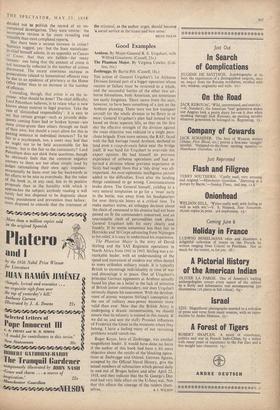Good Examples
Arnhem. By Major-General R. E. Urquhart, with Wilfred Greatorex. (Cassell, 21s.) Zeebrugge. By Barrie Pitt. (Cassell, 18s.) THE action of General Urquhart's 1st Airborne Division formed part of a bigger operation whose success or failure must be reviewed as a whole, and the successful battles of the other two air- borne formations, both American, are sometimes too easily forgotten. There seems from the start, however, to have been something of a jinx on the Arnhem planning. There were too few transport aircraft for the whole division to be flown in at once; General Urquhart's plan had instead to be based on three separate lifts, so that on the first day the effective strength of the division against the main objective was reduced to a single para- chute brigade. Even more serious, the RAF, faced with the flak barrage round Arnhem, declined to land even a coup-de-main force near the bridge itself. It was hard for Urquhart to over-rule this expert opinion. He had himself no previous experience of airborne operations and had in- herited a division whose previous experience in Sicily had taught them that a 'tidy drop' was all- important. An over-optimistic intelligence picture added to the difficulties. Even after the landing things continued to go wrong. Communications broke down. The General himself, yielding to a very natural temptation to go for a 'swan' early in the battle, was away from his headqoarters for over thirty-six hours at a critical time. To make matters worse, an unhappy decision' about the chain of command in his absence had not been passed on eo the commanders concerned, and an unavoidable clash of personalities took place. General Urquhart tells his story clearly and frankly. If he seems sometimes less than fair to Horrocks and 30 Corps advancing from Nijmegen to his relief, it is easy to understand his impatience.
The Phantom Major is the story of -David Stirling and the SAS Regiment operations in North Africa from 1941 to 1943. Stirling was a re- markable leader, with an understanding of the speed and movement of modern war often denied to more orthodox military minds. It is typically British to encourage individuality in time of war and discourage it in peace. One of Urquhart's principal German opponents at Arnhem actually based his plan on a belief in the lack of initiative of British junior commanders; nor does Urquhart seriously dispute his assessment. With the develop- ment of atomic weapons Stirling's conception of the use of military man-power becomes more valid than ever. Now that the British Army is undergoing a drastic reconstruction, we should ensure that its infantry is trained in this mould. If we did so, and sent the stuffy Prussian influences of Frederick the Great to the museums where they - belong, I have a feeling many of our recruiting problems would vanish too.
Roger Keyes, herb of Zeebrugge, was another magnificent leader. It would have done no harm if the author of this book had been a bit more objective about the results of the blocking opera- tions at Zeebrugge and Ostend. German figures, accepted by the Official Naval History, give the actual numbers of submarines which.passed daily in and out of Bruges before and after April 23, 1918, and they indicate that the St. George's Day raid had very little effect on the U-lioat war. Not that this affects the courage of the raiders them-


































 Previous page
Previous page